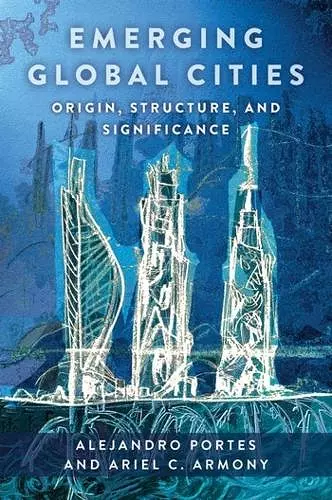Emerging Global Cities
Origin, Structure, and Significance
Alejandro Portes author Ariel C Armony author
Format:Paperback
Publisher:Columbia University Press
Published:27th Dec '22
Should be back in stock very soon

Certain cities—most famously New York, London, and Tokyo—have been identified as “global cities,” whose function in the world economy transcends national borders. Without the same fanfare, formerly peripheral and secondary cities have been growing in importance, emerging as global cities in their own right. The striking similarity of the skylines of Dubai, Miami, and Singapore is no coincidence: despite following different historical paths, all three have achieved newfound prominence through parallel trends.
In this groundbreaking book, Alejandro Portes and Ariel C. Armony demonstrate how the rapid and unexpected rise of these three cities recasts global urban studies. They identify the constellation of factors that allow certain urban places to become “emerging global cities”—centers of commerce, finance, art, and culture for entire regions. The book traces the transformations of Dubai, Miami, and Singapore, identifying key features common to these emerging global cities. It contrasts them with “global hopefuls,” cities that, at one point or another, aspired to become global, and analyzes how Hong Kong is threatened with the loss of this status. Portes and Armony highlight the importance of climate change to the prospects of emerging global cities, showing how the same economic system that propelled their rise now imperils their future. Emerging Global Cities provides a powerful new framework for understanding the role of peripheral cities in the world economy and how they compete for and sometimes achieve global standing.
Emerging Global Cities sets a new standard for the comparative study of cities. Combining historical analysis, political economy, demography, and institutional analysis with a deep understanding of the global division of economic labor, the authors produce a set of gripping profiles of the successful, the also-rans, and the precarious, and place them all in a compelling theoretical framework. -- Paul DiMaggio, New York University
Emerging Global Cities examines the processes of globalization from below through distinct yet potentially generalizable historical sequences. Portes and Armony explain how and why some cities in the developing periphery have managed to rise from positions of inferiority and insignificance to become leading players in the global economy. This book will soon become a benchmark for the study of global cities and a new classic for urban studies, development studies, and economic sociology. -- Min Zhou, University of California, Los Angeles
Portes and Armony offer us an exceptionally compelling and deeply perceptive rendering of twenty-first-century entrepôt cities—emergent urban centers driven and contoured by flows of people, ideas, money, and power. The conceptual tools they give us to understand how and why cities from Lagos to São Paulo to Miami are redrawing the global political map and charting our ecological future are indispensable for anyone interested in the rise and fall of cities and the flourishing of urban life. -- Natasha Iskander, New York University
Emerging Global Cities breaks new ground by bringing together into one comparative study a set of emerging global cities (and hopefuls) to explain how the global capitalist system is devolving power to new regional hubs. Portes and Armony bring new perspectives—on climate change, poverty, and inequality, for example—to bear in their study, with great attention to class and ethnic structures in these cities. -- James F. Hollifield, Ora Nixon Arnold Professor of International Political Economy, SMU
A useful introduction for advanced students of urban studies. * Choice *
I applaud the geographic range and historical detail of the case studies...The narrative and historical emphases make the book useful for undergraduate teaching in particular. * Contemporary Sociology *
ISBN: 9780231205177
Dimensions: unknown
Weight: unknown
368 pages